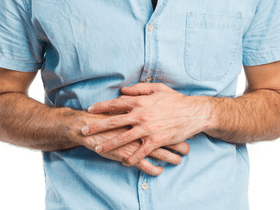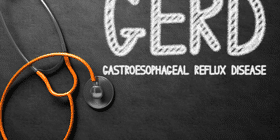Gastroesophageal reflux disease (GERD) is a chronic digestive condition that involves the stomach and the esophagus.
The lower esophageal sphincter is a circle-shaped band of muscle. During normal digestion, it opens so that food can enter the stomach and closes to ensure that food and stomach acid don’t return to the esophagus.
Gastroesophageal reflux occurs when the lower esophageal sphincter is loose or weak and contents from the stomach flow back into the esophagus.
This reflux or backwash often contains stomach acid. Over time, the acid can cause damage to the lining of the esophagus, which can lead to more serious conditions.
It’s normal to experience digestive issues such as acid reflux or heartburn from time to time—that doesn’t necessarily mean you have GERD.
Doctors typically diagnose GERD when acid reflux or heartburn appear more than twice per week, or when these symptoms start to interfere with day-to-day life.
Most of the time, GERD is managed through over-the-counter medications, in addition to diet and lifestyle changes.
But in more severe cases, prescription medication and even surgery might be necessary to reduce symptoms of GERD and prevent the degeneration of the esophagus.
What is the Role of a Hiatal Hernia in GERD?

A hiatal hernia is a condition that occurs when the uppermost part of the stomach moves up and through a small gap in the diaphragm, which is the muscle that separates the chest from the abdomen.
Some recent studies have shown that the opening in the diaphragm acts as a support for the lower part of the esophagus.
Some doctors believe a hiatal hernia may weaken the lower esophageal sphincter and increase the risk for gastroesophageal reflux. Still, that doesn’t mean everyone who has a hiatal hernia will experience heartburn and acid reflux. However, a hiatal hernia may make it easier for the contents of the stomach to pass into the esophagus.
Hiatal hernias can be caused by straining, vomiting, coughing, sudden physical exertion causing pressure in the abdomen, and conditions such as obesity and pregnancy.
Indeed, among otherwise healthy people over the age of 50, minor hiatal hernias are common. Though this condition is often associated with middle-age, it can happen to anyone.
GERD – Other Causes
While frequent acid reflux may be caused by hiatal hernias, other factors can also contribute. For instance, certain dietary and lifestyle factors can trigger heartburn and acid reflux.
These include consumption of coffee, fried foods, fatty foods, peppermint, chocolate, and alcoholic beverages. Eating large meals, and eating late at night can also contribute to the problem.
Cigarette smoking also plays a role, as it relaxes the lower esophageal sphincter. In some cases, pregnancy and obesity can also lead to more frequent acid reflux, as can some medications.
Symptoms of GERD

Signs and symptoms of gastroesophageal reflux disease include:
- Experiencing a burning sensation in the chest (heartburn) which sometimes spreads to the throat, leaving an acid or bitter taste in your mouth
- Chest pain
- Dry cough
- Difficulty swallowing
- A hoarse or a sore throat
- Regurgitating sour liquid or food (acid reflux)
- The sensation of a lump in the throat
You should schedule an appointment with a doctor if you experience frequent or severe episodes of the symptoms listed above. In addition, if you take over-the-counter medication for heartburn often, you should talk to your doctor.
You should seek emergency medical attention if you are experiencing chest pain, especially if it’s accompanied by signs and symptoms such as jaw or arm pain, and shortness of breath.
These symptoms, which might feel like those of GERD, are indicators of a heart attack.
Treatments and Lifestyle Changes
Most of the time, treatment for GERD starts with over-the-counter antacids (which help to neutralize acids), as well as drugs to reduce acid production. Over-the-counter antacids work right away, while drugs like H-2-receptor blockers that reduce acid production take longer to work, but may provide longer relief.
Your doctor might also recommend proton pump inhibitors to block acid production. They are stronger than H-2-receptor blockers and can help to give the esophagus the time it needs to heal.
If these medications don’t work, your doctor might suggest medication to help prevent relaxation of the lower esophageal sphincter.
Lifestyle changes are another important component of treatment. People who suffer from GERD can try the following:
- Maintaining a healthy weight
- Avoiding clothes that are too tight
- Avoiding food and drinks that trigger heartburn and acid reflux, including fatty foods, fried foods, alcoholic or caffeinated drinks, tomato sauce, mint, garlic, and onions
- Eating smaller meals
- Avoiding lying down after eating
- Keeping your head slightly elevated in bed
- Quitting smoking
When Treatment Doesn’t Work

Most of the time, GERD can be controlled through medication and lifestyle changes. But in cases where medication doesn’t seem to help or the side effects are too severe, a doctor may recommend more invasive treatments, including surgery.
Surgical procedures for GERD can help to reinforce the lower esophageal sphincter.
Don’t forget to save this page so you can come back to it later.
You can also learn more about the overall health of your gastrointestinal tract and how to avoid common problems.
The information in this article should not be taken as professional medical advice. If you are having issues or have health-related concerns, you should see your personal physician.


